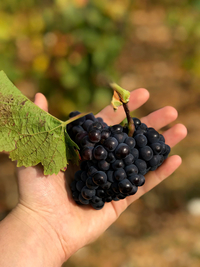Archives
October 2020
August 2020
June 2020
April 2020
January 2020
August 2019
July 2019
May 2019
August 2018
July 2018
May 2018
March 2018
November 2017
August 2017
February 2017
September 2016
January 2015
September 2014
July 2014
June 2014
May 2014
October 2013
July 2013
June 2013
May 2013
April 2013
March 2013
February 2013
January 2013
December 2012
November 2012
September 2012
August 2012
May 2012
April 2012
10 January 2020
A Guide to: Biodynamic, Organic & Natural Wine

Across the modern world, people have suddenly become much more conscious of what they are putting into their bodies; what type of diet they follow, what quality of foods they consume and it stands to reason, what type of alcohol they drink. The organic food movement has increased in reach to include organic wine, biodynamic wine and natural wines.
Just as within the organic food movement, there are a variety of ways to classify and organise how the wine has been produced. These days, as wine goes; the four most prevalent classifications are, biodynamic wine, sulphite free wine, sustainable wine and organic wine. All four of these practices involve different techniques, certifications and guidelines - which can prove to be a little confusing for the uneducated, so let us explain.
Biodynamic Wine
Biodynamic wine goes above and beyond just following organic farming practices (more on these later); in a bid to create a balance within the vineyard, nature and even the lunar cycles. This method is based on the writings and teachings of Rudolph Steiner who was of the opinion that a vineyard is one singular ecosystem, and that when that ecosystem is in true balance will grow the best possible fruit. Biodynamic farming practices are widely used and accepted around the world, but there is no formal verification for it. This is why many biodynamic winemakers are choosing to add the organic verification to their bottles, this is true as the grapes have in fact been grown and processed using organic methods; they just happen to be biodynamic as well.
Organic Wine
As you might have worked out, organic wine is made from grapes that have been grown organically. These grapes will have been grown on an organic farm which will be organically certified. Organic wine is currently the only wine that can carry any type of legal certification. The approval from legal bodies signifies that the wine in the bottle has been made with 100% organically grown ingredients and has been monitored throughout the entirety of the winemaking process, from vine to bottle.
Sustainable Wine
Sustainable practices to grow wine are based around the idea that farming is not only beneficial to the environment, but is also conducive to economic success. This in essence means that the farmer might largely rely on and use organic farming practices, but if some of those practices prove to be economically inefficient (e.g. they’re too expensive), the farmer might choose to skip a few of them. Sustainable wine doesn’t have any formal certification but there are several well-known and respected organisations and associations that winemakers can apply to join to formally list themselves as a sustainable vineyard.
Sulphite Free Wine
Sulphite free wine is wine that has been produced with no added sulphites. Sulphites occur naturally in wines; they are produced during the fermentation process. However, additional sulphites can be added to wines to prevent oxidisation and to maintain a wine’s freshness. There is now a movement to champion sulphite free wines as they only contain the naturally occurring sulphites, just how nature intended it.
With the renewed movement focused on health, vitality and just generally looking after our bodies; it is easy to understand the dramatic rise in popularity of these types of wines.